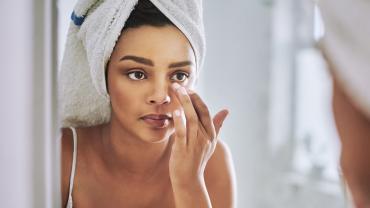
Collagen is the primary structural protein in connective tissue. It is formed by certain amino acids that include glycine, proline, and hydroxyproline-containing tri-peptides. Changes to collagen metabolism may occur from the normal aging process and other environmental, hormonal, and photo-aging factors. These changes may cause a loss of elasticity, increased vulnerability to damage, or changes to hydration or thickness in certain layers of the skin. Decreases in collagen production and the number of fibroblasts, or collagen-producing cells, may also occur.
In laboratory studies, supplementation with collagen peptides stimulated the extracellular matrix molecule production in fibroblasts. Animal studies indicated that oral intake of collagen peptides increased collagen fibrils, density, and fibroblast diameter. Collagen fragments act as a precursor for collagen synthesis in the skin and other connective tissues. Collagen and its fragments have also been shown to induce the differentiation of regulatory T cells and M2 macrophages that contribute to increased skin turnover and healthy tissue remodeling.
A randomized, double-blind, placebo-controlled trial assessed the efficacy of Verisol®, a bioactive collagen peptide (BCP), on eye wrinkle formation in women between 45 and 65 years of age. The treatment arm consisted of an oral dose of 2.5 g of BCP administered daily for 8 weeks. Study results indicate a statistically significant reduction of eye wrinkle volume and statistically significant higher content of procollagen type 1 and elastin as compared to the placebo group.
A recently published randomized, double-blind, placebo-controlled clinical trial explored the efficacy of oral supplementation with collagen hydrolysate (CH) in postmenopausal women. The authors report few other clinical trials of this nature with placebo control. This study was conducted for a duration of 4 weeks. The treatment arm included a daily intake of 5 g of CH. This study measured skin elasticity, particularly in sun-exposed areas.
Study results indicate significant improvement in skin elasticity at the end of the trial period. In addition, a follow-up visit occurred 4 weeks after participants discontinued CH. The authors reported that the improvements in elasticity that were observed during the treatment period were still present at the 4-week follow-up.
Collagen is an important structural component of skin and other connective tissues. Supplementation with collagen has been shown in studies to help support the structure and elasticity of connective tissue. It also may help support healthy collagen production.
By Colleen Ambrose, ND, MAT